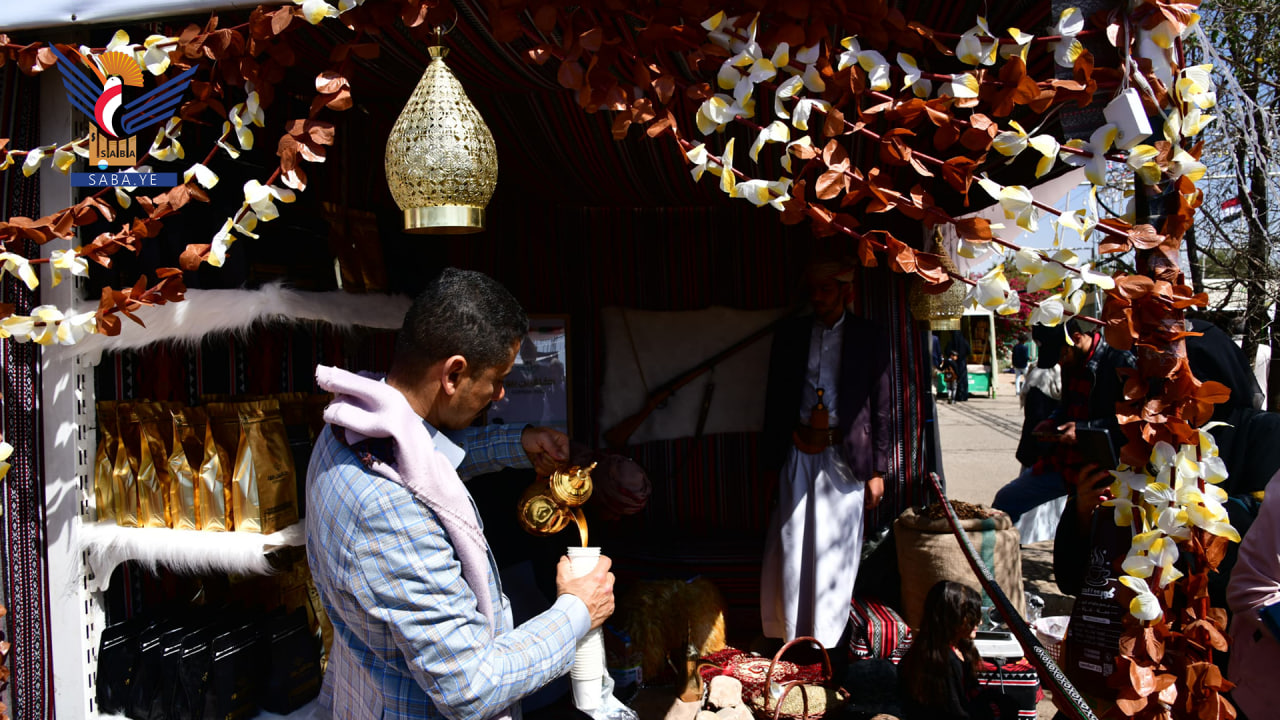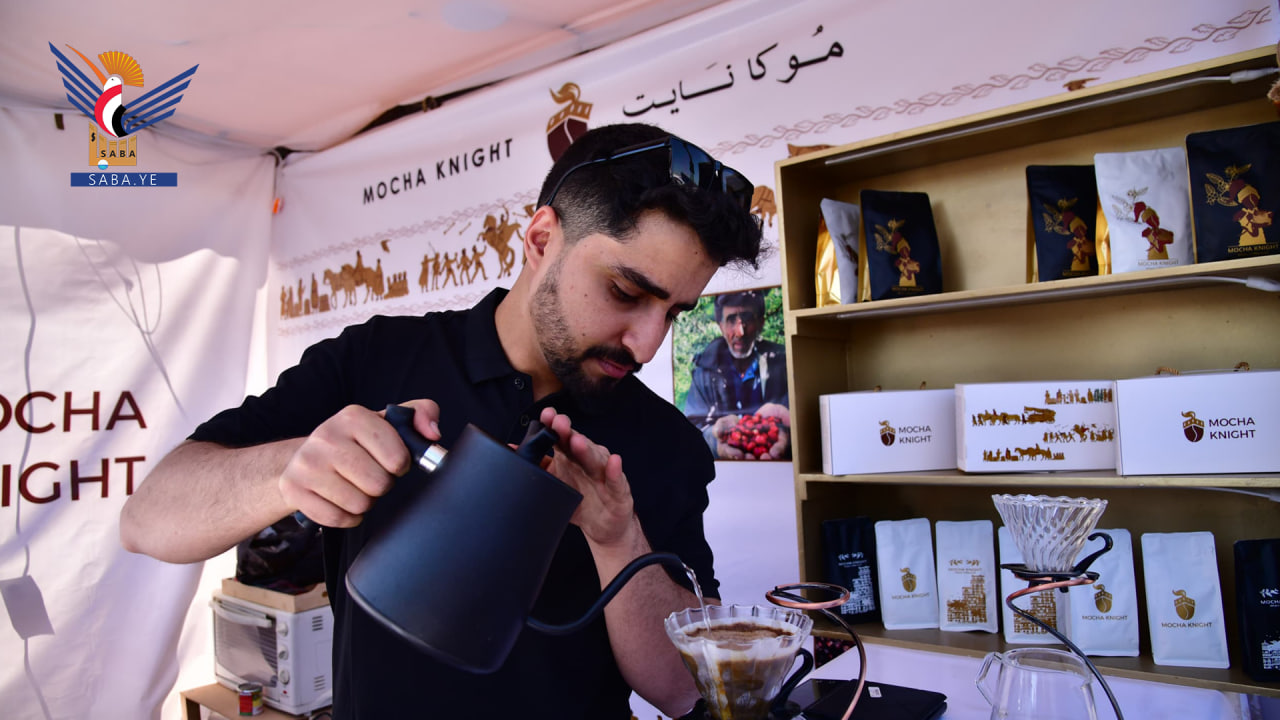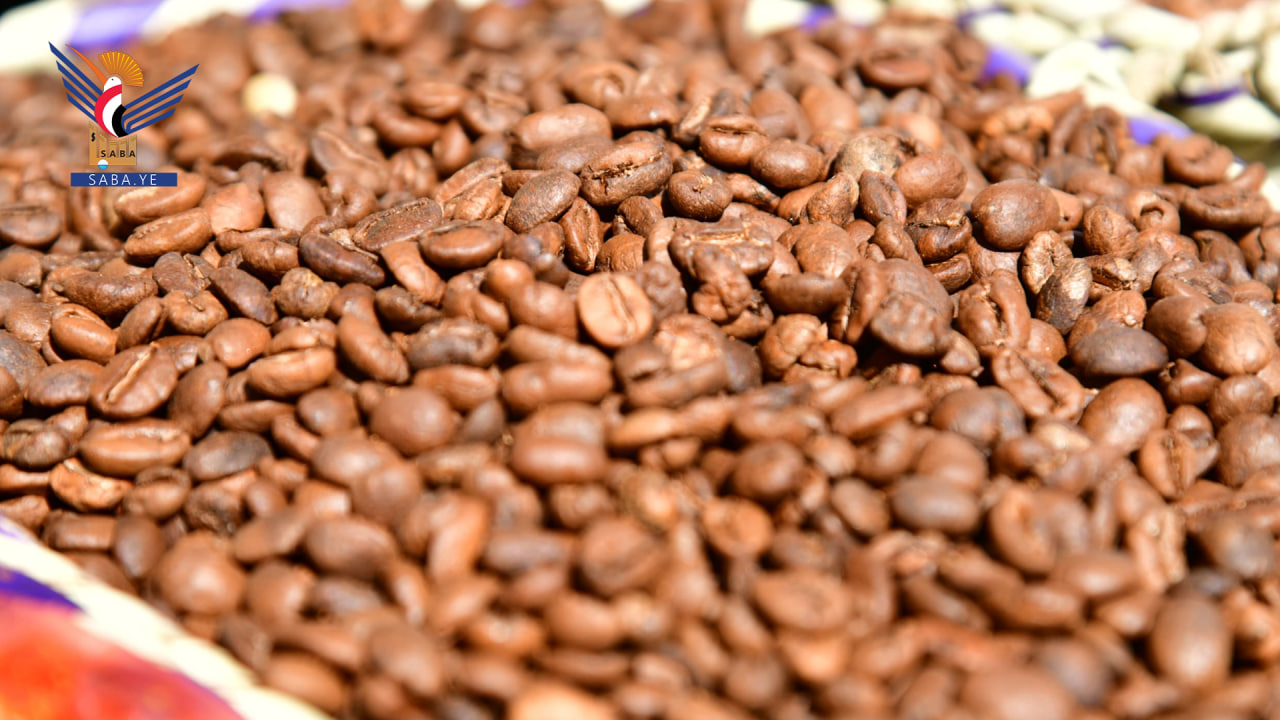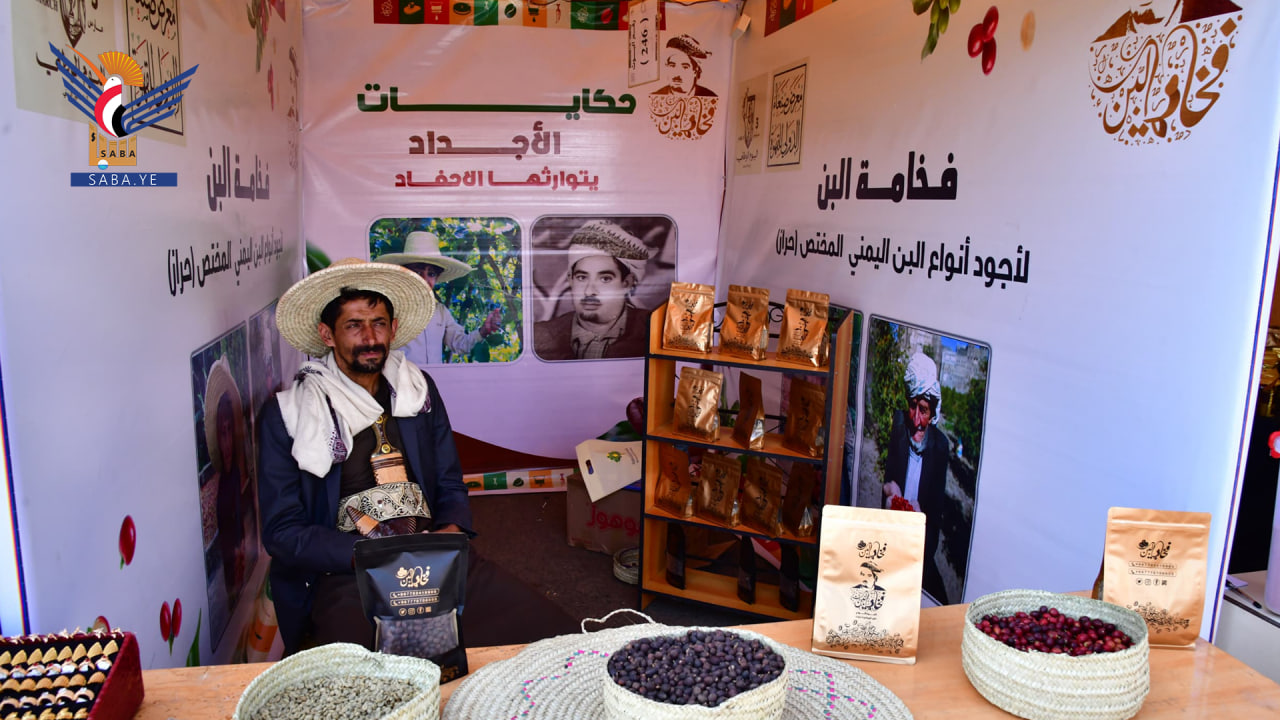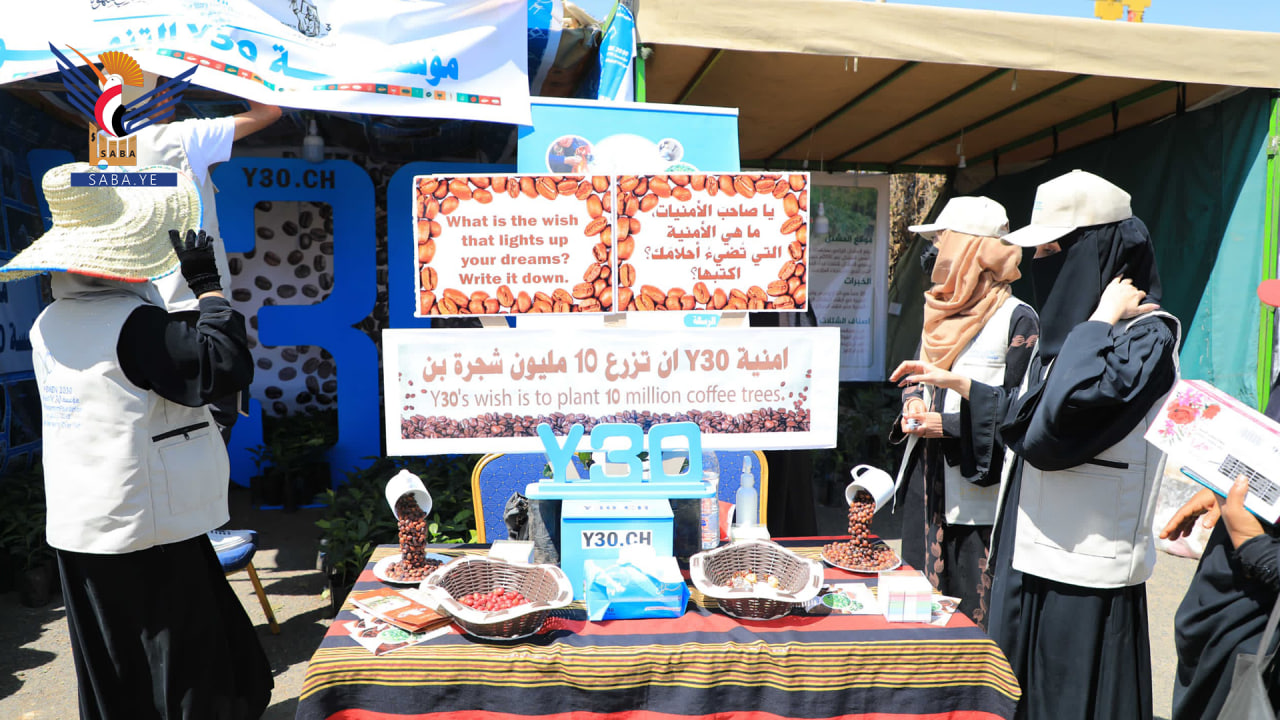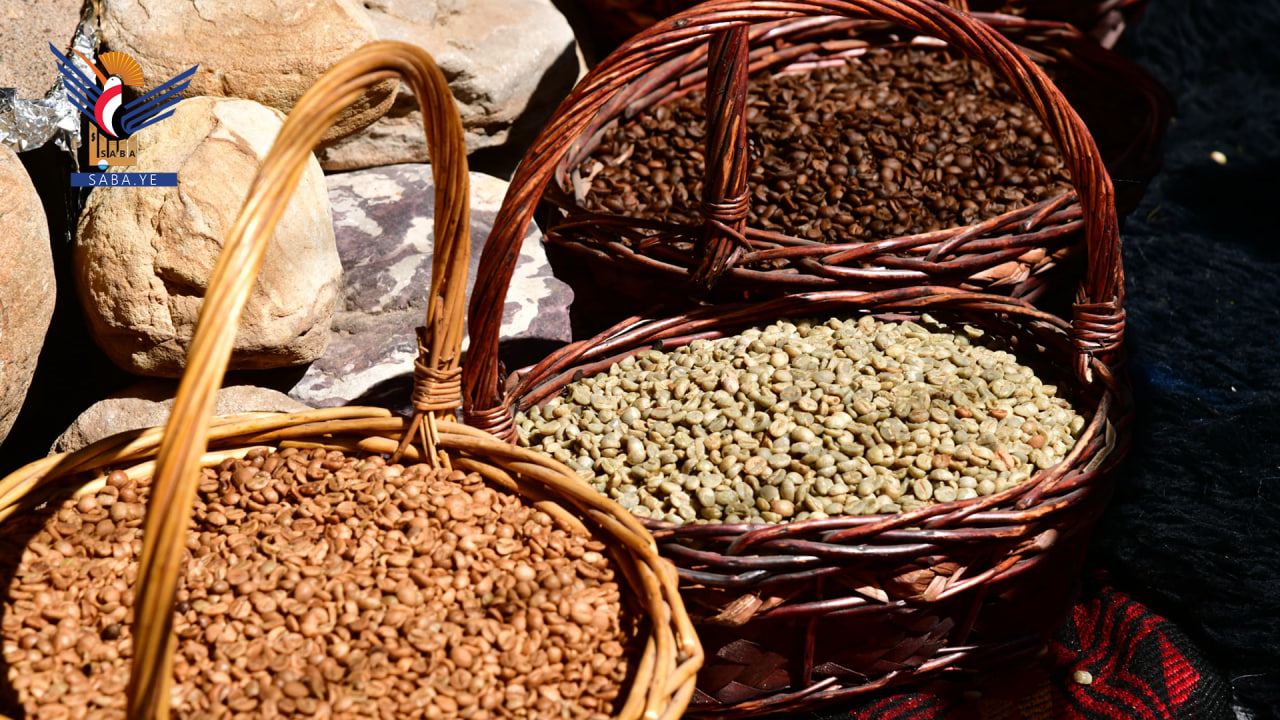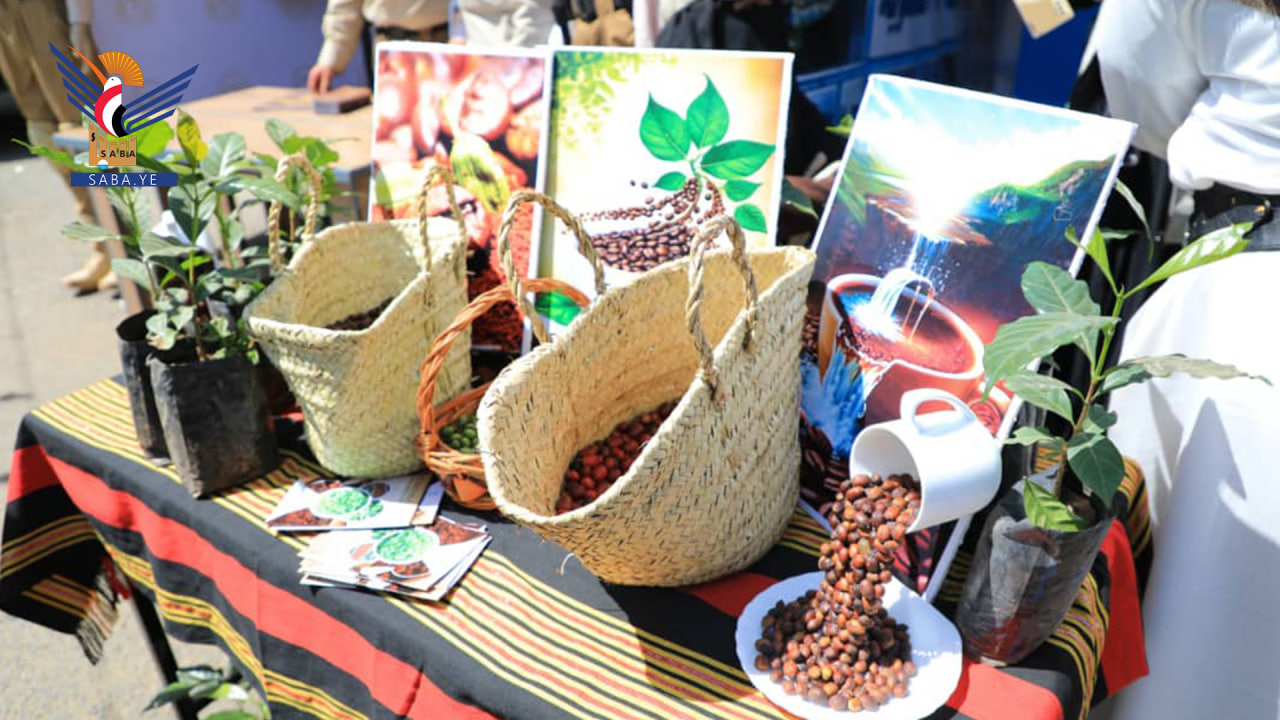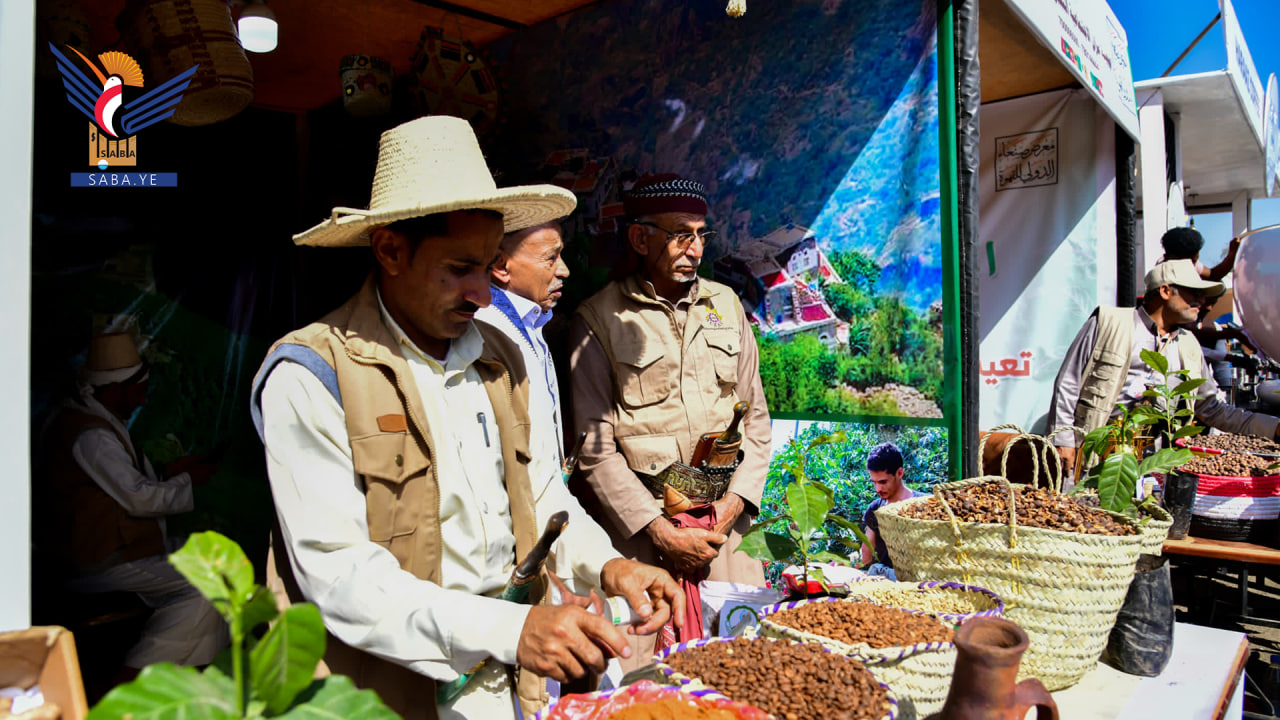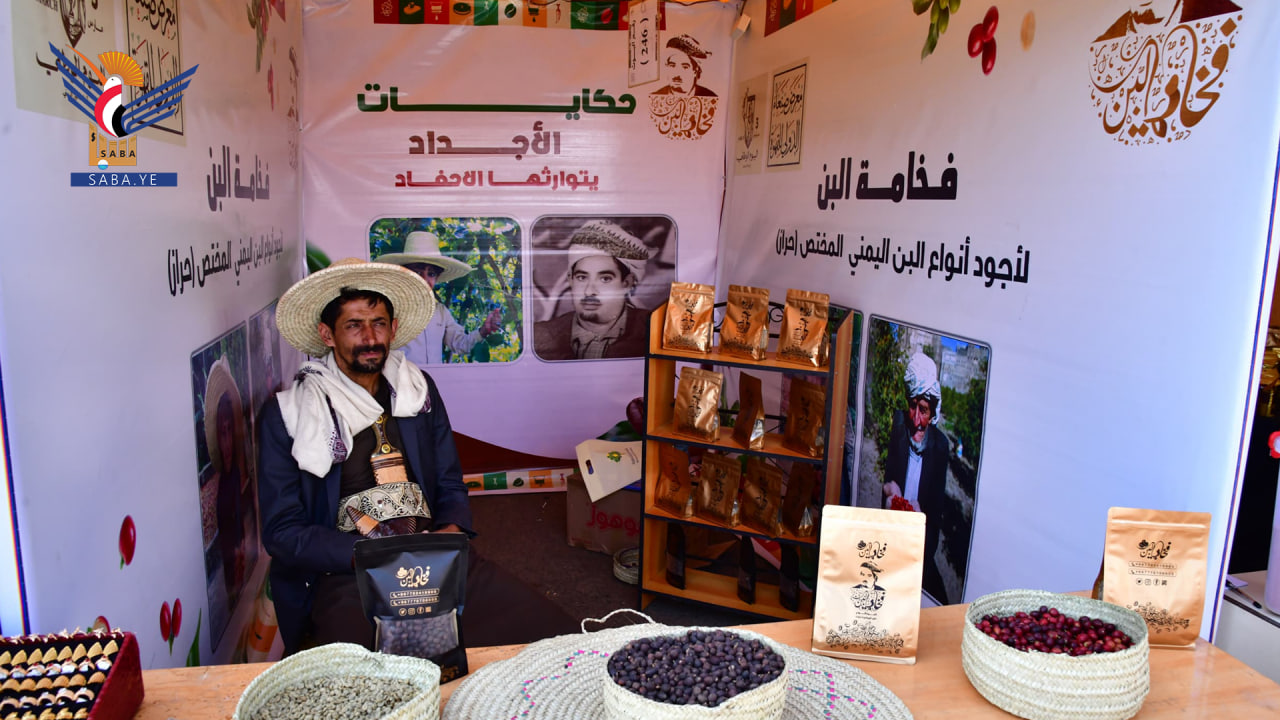
Sana'a - Saba:
From the heart of the capital, Sana'a, the scent of Yemeni coffee wafts through the atmosphere, weaving a magic that tells the story of a homeland whose roots extend deep into history.
Since the launch of the Sana'a International Coffee Exhibition last Sunday, the capital Sana'a has become a destination for coffee lovers, experts, farmers and those interested in a unique tasting journey during which they discover the secrets of Yemeni coffee extending from the foothills of the mountains to a cup that encapsulates in its flavour centuries of artisanal agriculture and ancient traditions.
The exhibition, which was organized by the Ministry of Agriculture, Fisheries and Water Resources, represented by the General Corporation for Coffee Development and Marketing, over five days, was not limited to displaying products, but also included awareness workshops on sustainable farming methods, modern roasting techniques, and the best marketing practices to ensure that the Yemeni product reaches global markets in the best possible way.
Words from the heart of the event:
In this survey, the Yemeni News Agency (Saba) monitored the echoes of the exhibition through meetings with its organizers, participating companies, productive families, and visitors, who agreed that this event is not just an exhibition, but rather a celebration of an eternal heritage, and an opportunity to highlight the quality of Yemeni coffee, which still sits on the throne of global taste.
The Minister of Agriculture, Fisheries and Water Resources, Dr. Radwan Al-Rubai, believes that coffee is an integral part of the cultural and economic identity of Yemen. It is a strategic cash crop that has always been linked to the history and civilization of this ancient country, in addition to its distinction for its high quality and unique flavor that has made it the focus of attention of coffee lovers around the world.
He pointed out that Yemen is the first home of the coffee tree, from where it spread to the rest of the world. This historical connection makes coffee a symbol of Yemeni identity and a source of pride for its people.
He explained that organizing coffee exhibitions, declaring March 3 of each year a national day, establishing the General Corporation for Coffee Development and Marketing, and issuing a decision to ban the import of foreign coffee of all types and forms, comes within the context of support and interest in this important cash crop.
The CEO of the General Corporation for Coffee Development and Marketing, Manea Al-Asal, stated that Yemeni coffee is one of the most expensive types of coffee in the world, because it is of the Arabic variety compared to other types of coffee that are of the Robusta variety.
He noted the advantages of Yemeni coffee, including its growth in dry areas and its constant exposure to the sun, which increases the concentration of aroma (volatile oils) that give it a distinctive flavour, in addition to the fact that Yemeni coffee is dried under the sun and peeled manually. It has also been proven that Yemeni coffee contains all the genetic genes, which are genes that are not found in any coffee in the world.
Al-Asal considered the Sana'a International Coffee Exhibition an important event to raise awareness of the importance of coffee cultivation and its unique characteristics and features.
While the Executive Director of the Yemeni National Coffee Day 2025 events, Mohammed Al Qasimi, pointed out that the expansion of the exhibition this year reflects the growing interest in the coffee sector.
He explained that the main objective of the exhibition is to support farmers by enhancing local and global marketing, as the lack of marketing is the biggest obstacle to farmers achieving fair profits, stressing the importance of supporting farmers and providing them with knowledge and modern technologies to ensure improving the quality of the coffee produced.
For his part, the Director of the Sana'a International Coffee Exhibition, Ali Al-Hareb, stated that the exhibitions are among the most important marketing and promotional activities for agricultural products, indicating that the number of participants in the exhibition witnessed a noticeable increase from 150 participants in previous exhibitions to more than 250 entities from companies, associations and official institutions this year.
He believed that the wide participation in the exhibition reflects the growing interest in the coffee sector, as the exhibition seeks to provide a comprehensive picture of this luxurious product, and also reflects the growing awareness of the quality of Yemeni coffee and its ability to compete globally.
He pointed out that the exhibition included several pavilions, including the historical pavilion that narrates the story of Yemeni coffee since its inception, and various companies and entities that participated actively, in addition to the “Yemeni Coffee Cubs” corner, which aimed to promote coffee culture among children, so that they grow up aware of the importance of the crop, which is part of their national identity, noting that instilling this culture in the souls of rising generations will contribute to preserving this precious legacy and ensuring its continuity over time.
Investment support:
As for the Head of the Projects Sector at the General Investment Authority, Eng. Mohammed Al-Farzai , he saw that the exhibition has become an annual phenomenon that develops in each session, stressing the need to focus on coffee value chains, such as marketing, packaging, production, wrapping, and seeds, with the aim of expanding production and reducing its costs to become a globally competitive crop.
He expected that investment in the coffee sector infrastructure would have a significant impact on productivity, explaining that enhancing modern agricultural techniques and paying attention to soil quality and irrigation could contribute to increasing production and improving its quality, calling for the establishment of specialized centers to support farmers and provide them with the necessary guidance.
For his part, the Chairman of the Board of Directors of the Chamber of Commerce and Industry in the Capital Secretariat, Ali Al-Hadi, stressed the necessity of marketing Yemeni coffee globally, indicating that the Chamber of Commerce supports the coffee sector in all its production and marketing chains, considering investment in the coffee sector a promising economic opportunity, and it must be one of the sustainable economic alternatives to qat.
Identity is renewed:
In the exhibition halls, coffee is not just a drink, but it is transformed into a complete sensory experience; its unique flavour, its fragrant aroma that fills the air, and the colours of the beans that tell stories of the land, effort and passion. It is a celebration of Yemeni coffee, a legacy that continues to shine despite the passing of time, confirming that every cup has a story, and every bean of coffee has a flavour of the homeland’s fragrance.
In this context, the head of the Union of Coffee Producers Associations, Mohammed Hassan, stressed that Yemen is the original home of coffee, and that this crop has been part of the Yemeni identity for more than a thousand years. He indicated that the exhibition is a promotional opportunity to introduce the world to the quality of Yemeni coffee and enhance its position in global markets, calling for providing more support to farmers, so that they can continue to produce the luxury coffee for which the country is famous.
Participants' experiences:
Among the participants in the exhibition, Kholoud Al-Qudsi from Aqyal Yemeni Coffee Company spoke about the importance of providing support to farmers in the areas of agricultural guidance, fertilizers and irrigation machines, which helps in raising the quality of production, stressing that the exhibition is an ideal opportunity to promote Yemeni coffee locally and globally.
As for Fatima Al-Shamiri from the Kanzi Project, she stressed the importance of these exhibitions in introducing local and international consumers to Yemeni coffee, pointing out the necessity of providing the product at competitive prices to ensure continued demand for it.
While Jamil Al-Masouri , owner of the “Take My Country” project, narrated his experience in establishing a project to support his children with mental disabilities by marketing local products, including coffee, explaining that his project, which started from home, now includes more than 31 distribution points, reflecting the demand for high-quality local products.
Originality and uniqueness:
The great turnout at the exhibition reflects Yemen’s status as the first home of coffee, where Mocha was a name that was passed around in every corner of the world, a testament to the glory of this product that remained a symbol of authenticity and uniqueness.
Media professional Ahmed Al-Jamani, one of the visitors to the exhibition, expressed his great admiration for the variety of products and different presentation methods, considering that such events not only enhance awareness of the importance of Yemeni coffee, but also create an enjoyable cultural environment that brings together coffee lovers and experts in this field.
He believed that the continuation of holding these events would contribute to promoting Yemeni coffee more, especially among young people who have begun to take an interest in specialty coffee.
According to Al-Jamani , Yemeni coffee faces fierce competition in global markets, but it is distinguished by its unique quality and rich flavour, which makes it in demand among lovers of specialty coffee. He urged holding such events to enhance the awareness of local and international consumers of the importance of supporting the Yemeni product, especially in light of the difficult economic conditions the country is going through.
He stressed that the demand for Yemeni coffee is increasing, but there is still a need to strengthen supply chains and improve processing and marketing methods, explaining that supporting small and medium enterprises working in this field will contribute significantly to developing the industry and increasing job opportunities for Yemeni youth.
Quality and Marketing:
Sami Taher, owner of Al Taher Company for Exporting Yemeni Products, believes that the Sana’a International Coffee Exhibition is not just a commercial event, but a unique platform for conveying Yemeni heritage domestically and abroad, and introducing the world to the quality of Yemeni coffee that has always distinguished it throughout the ages.
He stressed that Yemeni coffee is not just an agricultural crop, but a cultural heritage that reflects the authenticity of Yemen and its culture that has been rooted for centuries, indicating that Yemeni coffee has been a major economic front for the country for centuries, and was exported to various parts of the world, becoming an integral part of the country's commercial and economic landscape. However, today it faces major challenges related to marketing, quality, and export, which necessitates the development of modern strategies to promote this luxurious product.
While Taher praises the efforts of the Ministry of Agriculture and government agencies in organizing exhibitions and supporting the coffee sector, he stresses the need to continue marketing efforts and expand the scope of promoting the Yemeni product globally.
He said that there are clear government facilities, such as banning the import of foreign coffee, which constitutes a golden opportunity to enhance local production, but companies must take advantage of this opportunity by improving the quality of production, enhancing the added value of the product, and building strong brands that reflect the distinction of Yemeni coffee in global markets.
Adel Rassam, a researcher in coffee value chains and supervisor of the Khawlani coffee pavilion at the exhibition, believes that preserving the quality of Yemeni coffee requires integrated efforts that start from the farm and extend until the product reaches the consumer. He said: “We came today to participate in this great coffee wedding, and to represent Khawlani coffee coming from Saada Governorate, which is one of the most famous and well-known types of Yemeni coffee ever.”
According to Rassam, Khawlani coffee constitutes 40-45% of the total Yemeni coffee production, and about 80% of it is exported to foreign markets, especially to the Gulf countries, where it enjoys an excellent reputation and unique flavours. He stressed that Yemeni coffee in general is of high quality, but it needs modern marketing strategies to enhance its position globally.
Rassam said that one of the biggest challenges facing Yemeni coffee is commercial fraud, which affects its reputation and quality. He explained that in the past, traders used to deliver coffee with complete honesty, but with the absence of adequate oversight, some practices have spread that affect the quality of the product.
He pointed out that there are modern scientific methods to ensure the quality of coffee, including building specialized export companies and launching brands that adhere to the highest quality standards, starting from planting excellent varieties, through proper harvesting and drying methods, and reaching storage, packaging and export in a professional manner.
Rassam stressed the need to provide quality tracking and monitoring systems that ensure the protection of the product from tampering, in addition to activating the role of agricultural associations and regulatory institutions to grant internationally recognized quality certificates, warning that any monitoring must be far from bureaucracy and corruption, because the free market and competition are the best way to enhance the position of Yemeni coffee on the global level.
Renewable history:
In the halls of the exhibition, voices of love for this heritage rose, and opinions poured in confirming that Yemeni coffee is not just a drink, but an identity and history that is renewed with every cup.
Mohammed Al-Omari, a researcher and historian, explained that this is the third year for the Manuscripts Department and the Historical Pavilion to participate in the exhibition, but every year witnesses a clear development, and the goal of this is to highlight the authenticity of Yemeni coffee, as the Yemenis are credited with discovering this plant, which was used as a fruit, and then was transformed into a drink.
He explained that it was initially forbidden by jurists, until it was argued and proven that coffee is not an intoxicant, and then the coffee journey began from Yemen to the world, indicating that Yemen is the source of coffee, and that the Yemenis were the first to cultivate and discover it, and they continued for centuries to sit on the throne of coffee worldwide.
According to researcher Al-Omari, there were international conflicts between the Netherlands, Austria, and the Ottomans, and before them the Portuguese, competing over Mocha, and over this drink that became famous and filled the corners of the world.
This is confirmed by documents that include requests for coffee from some kings, such as the request of the English king from the Ottoman Sultan in 1791 AD, where he requested this substance that made him happy. Another request was also mentioned from the Ottoman Sultan, who specified his request from the Banu Matar, Anas, and Al-Haymah, in reference to the specific location of the coffee substance.
Al-Omari said, “These documents and manuscripts have original copies in the British, German, and Dutch archives, and we have collected them to show the whole world the story of coffee, its discovery, and how the Yemenis exported it to the world.” He pointed out that the state’s move to celebrate coffee will return Yemen to the forefront as it was before, and “Mocha” is the greatest evidence of the authenticity of Yemeni coffee.
He denounced the classification of some other countries as the origin of Arabic coffee, without relying on any historical sources, saying: “All they have to do is go to the international museums, German, French and others, and read Niebuhr’s book of 1763.” He added: “This year, we also obtained a historical document that we can call ‘Moses’s staff’ that debunks all their lies, as this document is 800 years old, and it talks about Yemeni coffee in detail. Its origin is in the British archives, where it was taken in 1839, in an attempt to lose the importance of the port of Mocha, and the search is still ongoing for other documents.”
Marketing window:
Journalist Mohammed Hatem describes the Sana'a International Coffee Exhibition as a marketing window and an important event that reflects the historical and economic status of the Yemeni coffee crop, which is linked to the history and identity of the Yemeni people. He considers the exhibition a wonderful opportunity to introduce the world to the quality of Yemeni coffee, raise awareness of the importance of this strategic product, and support efforts to develop and market it locally and internationally.
Holding such festivals and exhibitions contributes greatly to promoting coffee, and creates community awareness of the importance of this crop, in addition to contributing to the meeting of producers, manufacturers, marketers and exporters in one place, in addition to strengthening the agricultural identity of Yemen. It is also an important platform for exchanging experiences between specialists, and forming partnerships that contribute to developing the agricultural sector and strengthening the national economy.
Wide participation:
Moti’ Al-Hamidi, one of the supervisors of the exhibition’s organization, said that the exhibition’s events and activities enjoyed wide participation from participants and visitors, indicating that the turnout exceeded expectations, as the people of Yemen naturally taste coffee.
He expressed his hope that such exhibitions would continue on a regular basis, in order to enhance the culture of coffee, revive its history and symbolism , restore its heritage, and spread the culture of coffee as an identity and civilization for the Yemeni people.
With this great diversity of viewpoints, it becomes clear that Yemeni coffee is not just an agricultural product, but a national identity and a cultural and economic legacy that deserves attention. Through such events, the status of Yemeni coffee can be enhanced globally, and solutions can be found to the challenges facing its cultivation and production.
Every cup of Yemeni coffee carries within it a story of struggle and creativity, proudly told among generations, and confirms that this drink will remain an integral part of Yemen’s ancient civilization and heritage.
